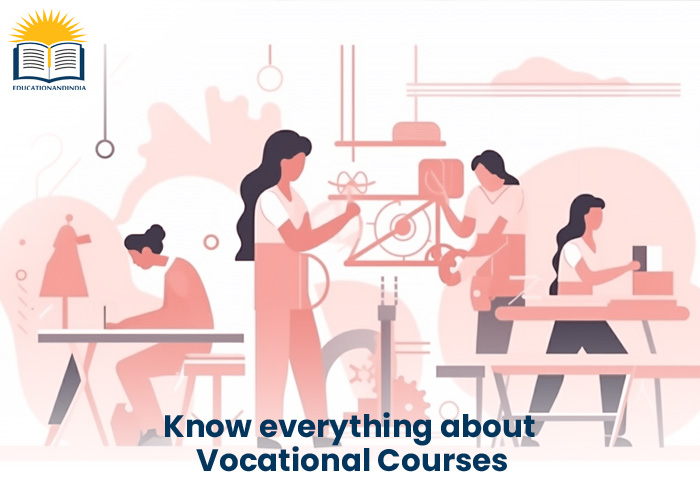Know Everything About Vocational Couses : Benefits, Eligibility, Types, etc.

When it comes to education, many students are unaware of the diverse options available beyond traditional degree courses. In this blog, we'll delve into vocational courses, which offer a practical, time-efficient, and cost-effective alternative for those looking to gain hands-on skills and boost their job prospects.
What Are Vocational Courses?
Vocational courses are specialized programs designed to equip students with practical skills and knowledge in specific trades or professions. Unlike traditional degree courses that emphasize theoretical learning, vocational courses focus on hands-on training, ensuring that students are job-ready upon completion.
Key Characteristics of Vocational Courses
-
Practical Focus: Vocational courses prioritize practical knowledge over theoretical understanding. Students spend more time in labs, workshops, and real-world settings.
-
Shorter Duration: These courses are generally shorter than traditional degree programs, ranging from a few months to two years. This allows students to enter the workforce more quickly.
-
Cost-Effective: Vocational courses often have lower tuition fees compared to degree courses. This makes them an attractive option for those looking to save on educational expenses.
-
Job-Ready Skills: The main goal of vocational education is to prepare students for specific careers. This means that upon graduation, students possess the skills needed to perform effectively in their chosen field.
Who Can Enroll in Vocational Courses?
Vocational courses are suitable for a wide range of students, including:
- 10th and 12th Pass Students: Many vocational programs are open to students who have completed their 10th or 12th grade. Some certificate courses can even be pursued after the 10th grade.
- Career Changers: Individuals looking to switch careers or gain new skills can benefit from the practical training offered by vocational courses.
- Working Professionals: These courses can also be a great option for professionals seeking to enhance their skills or gain certification in a new area.
Types of Vocational Courses
Vocational education spans a wide array of fields, offering numerous options to students. Here are some popular categories and examples of vocational courses:
-
Healthcare: Courses in this field prepare students for roles such as medical assistants, healthcare technicians, and patient care specialists.
-
Technology: Web design, graphic design, and IT support are some of the popular vocational courses in the tech sector.
-
Creative Arts: Programs in photography, cosmetology, and game design cater to those with a creative flair.
-
Hospitality and Management: Vocational courses in hotel management, event management, and international trade management offer practical training for the hospitality industry.
-
Technical Trades: Automotive repair, plumbing, and air conditioning are examples of technical vocational courses that provide hands-on training in essential trades.
Benefits of Vocational Courses
-
Hands-On Experience: Students receive extensive practical training, making them proficient in their chosen field.
-
Employment Opportunities: Vocational courses are designed to meet industry demands, increasing the employability of graduates. Many vocational programs include internships or apprenticeships, providing real-world experience and networking opportunities.
-
Affordability: With lower tuition fees and shorter course durations, vocational education is a cost-effective alternative to traditional degrees.
-
Flexibility: Vocational courses are often available in both online and offline formats, allowing students to choose a mode of learning that suits their schedule and preferences.
Duration and Cost
The duration of vocational courses varies based on the program and the level of certification. Typically, certificate courses can be completed in a few months, while diploma courses may take one to two years. The cost of vocational education is generally lower than that of traditional degree programs. Certificate courses can start from INR 15,000 to 20,000, making them accessible to a broader range of students.
Where to Pursue Vocational Courses
Vocational courses are offered by numerous universities and institutes across India. Here are some notable institutions known for their vocational programs:
- Jaipur National University
- Sharda University, Greater Noida
- Amity University, Noida
- Noida College
- Devi Ahilya University, Indore
- Assam University, Silchar
- Jamia Millia Islamia University, New Delhi
- Patna University
Most states have institutes and universities that offer a variety of vocational courses, ensuring that students can find programs close to home.
Conclusion
Vocational courses provide a practical, efficient, and cost-effective pathway to career success. With a focus on hands-on training and real-world skills, these programs prepare students for immediate employment in a wide range of industries. Whether you're a recent high school graduate, a professional looking to switch careers, or someone seeking to enhance your skills, vocational education offers a valuable alternative to traditional degree programs.
By choosing the right vocational course, you can gain the skills needed to excel in your chosen field, increase your employability, and embark on a rewarding career journey. Explore the various vocational courses available, and take the first step towards a successful and fulfilling career.